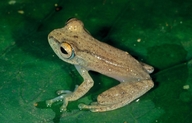|
Description
M 23-25 mm. Tibiotarsal articulation reaches at least beyond the eye, sometimes clearly beyond snout tip. Hand with some webbing, foot webbing 1(0.5), 2i(1), 2e(0), 3i(1), 3e(0), 4i (2), 4e(1.5), 5(0.5). Dorsal skin smooth. Dorsally beige to light greyish brown with two dark brown bands running from the nostril, passing above the eye, to the middle back. These bands can be indistinct but usually are at least faintly recognizable in all specimens. There is no reddish colouration on the feet or the ventral side (Glaw and Vences 2007).
Similar species: This species appears to be restricted to northern Madagascar; other species of the B. majori group from this area are B. marojezensis and B. blommersae. The dark dorsal markings of B. vittatus, in combination with an otherwise uniformly coloured dorsum, are quite characteristic and have never been observed in other Boophis species so far (Glaw and Vences 2007).
Distribution and Habitat
Country distribution from AmphibiaWeb's database: Madagascar
Marojejy, Manongarivo, Tsaratanana (Antsahamanara campsite) (Glaw and Vences 2007). Occurs at elevations from 500-1,100 m asl (Andreone et al. 2008).Life History, Abundance, Activity, and Special Behaviors
Found along smaller, usually not fast-running streams in rainforest. Males call at night from perches in the vegetation 0.5-2 m above the ground (Glaw and Vences 2007). Breeds in small rainforest streams (Andreone et al. 2008). Trends and Threats
Locally abundant where suitable habitat occurs. Found in many protected areas. However, this species requires pristine rainforest, which is increasingly being lost outside the protected areas to subsistence agriculture, logging, charcoal manufacture, invasive spreading of eucalyptus forest, grazing, and expanding human settlement (Andreone et al. 2008). Comments
Taken with permission from Glaw and Vences (2007).
References
Andreone, F., Vences, M., and Vallan, D. (2008). Boophis vittatus. In: IUCN 2008. 2008 IUCN Red List of Threatened Species. www.iucnredlist.org. Downloaded on 15 March 2009.
Glaw, F., and Vences, M. (2007). Field Guide to the Amphibians and Reptiles of Madagascar. Third Edition. Vences and Glaw Verlag, Köln.
Originally submitted by: Miguel Vences and Frank Glaw (first posted 2009-03-04)
Edited by: Kellie Whittaker (2009-03-15)Species Account Citation: AmphibiaWeb 2009 Boophis vittatus <https://amphibiaweb.org/species/5932> University of California, Berkeley, CA, USA. Accessed Nov 26, 2024.
Feedback or comments about this page.
Citation: AmphibiaWeb. 2024. <https://amphibiaweb.org> University of California, Berkeley, CA, USA. Accessed 26 Nov 2024.
AmphibiaWeb's policy on data use.
|
